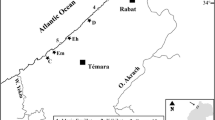Abstract
Tens of sea caves and other coastal karst landforms are to be found along the limestone coast of the Maltese Islands. Most of the sea caves develop around the present-day sea level, such as Blue Grotto, which is one of the widest and most spectacular sea cave on the islands. The Blue Grotto karst system is composed by partially submerged chambers, sea arches, gorges and small-scale landforms, such as coastal notches, and speleothems. Such landforms developed at the northwestern side of Wied Babu, in a half a kilometer wide bay near Żurrieq. This chapter presents the results of a detailed geomorphological survey of these coastal and karst landforms and discusses the origin and development of the studied landforms. The close relation with the sea level suggests that the system is partly related to former enlargement of dissolutionally widened karst voids and partly related to present-day marine processes, such as waves, and subaerial processes, including rock collapse. Although most of the species recorded from the environs of Filfla are common elsewhere around the Maltese Islands, in general, the recorded biotopes exhibit high species richness values, which is indicative of a low degree of anthropogenic pressure being exerted on the site.
Access this chapter
Tax calculation will be finalised at checkout
Purchases are for personal use only
Similar content being viewed by others
References
Alexander D (1988) A review of the physical geography of Malta and its significance for tectonic geomorphology, Quaternary Sci. Rev. 7:41–53
Antonioli F, Forti P (2003) Geologia e genesi delle grotte marine. In: Cicogna F, Bianchi NC, Ferrari G, Forti P (eds) Grotte marine: cinquant’anni di ricerca in Italia. CLEM, Ministero dell’Ambiente, Sezione Difesa Mare, 505p
Biolchi S, Furlani S, Devoto S, Gauci R, Castaldini D, Soldati M (2016) Geomorphological recognition, classification and spatial distribution of coastal landforms of Malta. J Maps 12(1):87–99
Dart CJ, Bosence DWJ, Mcclay KR (1993) Stratigraphy and structure of the Maltese graben system. J Geol Soc 150:1153–1166
Drago A (2009) Sea level variability and the ‘Milghuba’ seiche oscillations in the northern coast of Malta, Central Mediterranean. Phys Chem Earth 34:948–970
Finetti IR (1984) Geophysical study of the Sicily Channel Rift Zone. Bollettino di Geofisica Teorica ed Applicata 26:3–28
Furlani S, Cucchi F, Biolchi S (2012) Late Holocene widening of Karst voids by marine processes in partially submerged coastal caves (Northeastern Adriatic Sea). Geogr Fis e Din Quat 35(2):129–140
Furlani S, Antonioli F, Biolchi S, Gambin T, Gauci R, Lo Presti V, Anzidei M, Devoto S, Palombo M, Sulli A (2013) Relative sea level change in Malta. Quat Int 288:146–157
Furlani S, Antonioli F, Gambin T, Biolchi S, Formosa S, Lo Presti V, Mantovani M, Anzidei M, Calcagnile L, Quarta G (2018) Submerged speleothem in Malta indicates tectonic stability throughout the Holocene. Holocene 28(10):1588–1597
Furlani S, Gauci R, Devoto S, Schembri JA (2019) Filfla: a case study of the effect of target practice on coastal landforms. In: Gauci R, Schembri JA (eds) Landscapes and Landforms of the Maltese Islands. Springer, Switzerland, pp 261–271
Galdies C (2011) The climate of Malta: statistics, trends and analysis 1951–2010. National Statistics Office 8, Valletta, 45p
Galea P (2019) Central Mediterranean tectonics—a key player in the geomorphology of the Maltese Islands. In: Gauci R, Schembri JA (eds) Landscapes and Landforms of the Maltese Islands. Springer, Switzerland, pp 19–30
Gauci R, Scerri S (2019) A synthesis of different geomorphological landscapes on the Maltese Islands. In: Gauci R, Schembri JA (eds) Landscapes and Landforms of the Maltese Islands. Springer, Switzerland, pp 49–65
Gracia F, Clamor B, Landreth R, Vicens D, Watkinson P (2001) Evidencies geomorphologiques del canvis del nivell marì. In: Pons GX, Guijarro JA (eds) El canvi climatic: Passat present i future. Monografias Sociedad de Historia Natural de Balears 9, pp 91–120
Grove AT, Rackham O (2001) The nature of Mediterranean Europe: an ecological history. Yale University Press, New Haven, 384p
Illies JH (1981) Graben formation: the Maltese Islands—a case study. Tectonophysics 73:151–168
Mylroie JE, Carew JL (1990) The flank margin model for dissolution cave development in carbonate platforms. Earth Surf Proc Land 15:413–424
Pedley HM, House MR, Waugh B (1976) The geology of Malta and Gozo. Proc Geol 87(3):325–341
Pedley HM, Hughes-Clarke M, Galea P (2002) Limestone isles in a crystal sea: the geology of the Maltese Islands. Publishers Enterprises Group (PEG Ltd.), San Ġwann, 109p
Reuther CD, Eisbacher GH (1985) Pantelleria rift-crustal extension in a convergent intraplate setting. Geol Rundsch 74(3):585–597
Said G, Schembri JA (2010) Malta. In: Bird ECF (ed) Encyclopedia of the World’s Coastal Landforms. Springer, Dordrecht, pp 751–759
Scerri S (2019) Sedimentary evolution and resultant geological landscapes. In: Gauci R, Schembri JA (eds) Landscapes and Landforms of the Maltese Islands. Springer, Switzerland, pp 31–47
Saliba D (2008) Cave formations and processes in Malta. Unpublished BA (Hons) dissertation, University of Malta, Malta, 126p
Schembri JA (2003) Coastal land use in the Maltese Islands: A description and appraisal (Unpublished doctoral thesis). University of Durham, UK.
Schembri JA (2019) The geographical context of the Maltese Islands. In: Gauci R, Schembri JA (eds) Landscapes and Landforms of the Maltese Islands. Springer, Switzerland, pp 9–17
Sunamura T (1992) Geomorphology of rocky coasts. Wiley, New York, 302p
Acknowledgements
We are grateful to Godwin Farrugia for his precious advice regarding the local names of the sea caves.
Author information
Authors and Affiliations
Corresponding author
Editor information
Editors and Affiliations
Rights and permissions
Copyright information
© 2019 Springer Nature Switzerland AG
About this chapter
Cite this chapter
Furlani, S., Gauci, R., Biolchi, S. (2019). Sea Caves and Coastal Karst Scenery along the Maltese Coasts: The Case Study of Blue Grotto. In: Gauci, R., Schembri, J. (eds) Landscapes and Landforms of the Maltese Islands. World Geomorphological Landscapes. Springer, Cham. https://doi.org/10.1007/978-3-030-15456-1_25
Download citation
DOI: https://doi.org/10.1007/978-3-030-15456-1_25
Published:
Publisher Name: Springer, Cham
Print ISBN: 978-3-030-15454-7
Online ISBN: 978-3-030-15456-1
eBook Packages: Earth and Environmental ScienceEarth and Environmental Science (R0)




